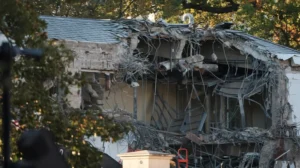India’s Supreme Court has ruled that ‘bulldozer justice’ — instant demolitions mainly targeting Muslims for alleged crimes — is unconstitutional, rebuking authorities close to Prime Minister Narendra Modi.
A bulldozer demolishes the house of a Muslim man
In what is termed ‘bulldozer justice’ properties belonging to people accused of crimes without due process are demolished
India’s Supreme Court on Wednesday ruled that the government cannot order the demolition of property belonging to people accused of crimes without allowing for due judicial process.
In its judgement, the court said such demolitions “would strike at the basic principle of rule of law and is not permissible.”
The court ruled that a notice must be issued with at least 15 days for the owner to respond and must provide an opportunity for personal hearing, among other guidelines.
The judgement emphasized that only the judiciary has the authority to determine guilt and any action without proper legal procedures, violates the principles of justice and the rule of law.
Incidentally, these demolitions are colloquially termed “bulldozer justice.”
‘Anti-encroachment’ drives or ‘punishment’?
Prime Minister Narendra Modi’s Hindu nationalist Bharatiya Janata Party (BJP) has been accused by rights groups and critics of levelling properties belonging to Muslims in so-called “anti-encroachment” drives.
While officials have said the demolitions only targeted illegal buildings, rights groups and critics say they are an attempt to harass and marginalize religious minorities, pointing to a wave of rising religious tensions under Modi’s rule.
Indian Muslims targets of BJP ‘bulldozer justice’
In February, London-based rights group Amnesty International said in a report that authorities in the Indian capital, Delhi, along with BJP-ruled states of Assam, Gujarat, Madhya Pradesh and Uttar Pradesh have carried out demolitions as a “punishment” following communal clashes or protests against discriminatory government policies.
The Supreme Court in its judgement on Tuesday said selective demolitions without addressing similar illegal structures are considered arbitrary and potentially malicious, indicating punitive intent.
The court called it “an action of penalizing the accused without even trying him before the court of law.”







